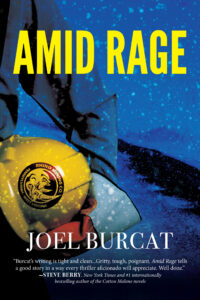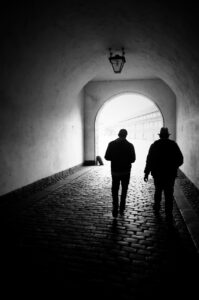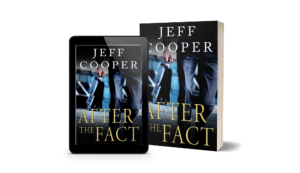Scroll Down to Read Part I
How has the Internet and online publishing (especially short stories) impacted your writing career?
For me the primary impact of the internet and online publishing has been shorter pieces, resulting in fewer avenues to explore, say, a story’s character, conflict, or theme. I began publishing short fiction in 1995 and mainly in print and often university related literary journals. The suggested word count for a submission then was 5000 to 7500. Over the succeeding years as the number of online journals began to outpace those in print that number continued to shrink so that today the preferred word count for most journals is 2500 to 3000. Since each of my published stories has gone through twenty or more revisions, the shorter pieces haven’t necessarily been made stronger because, as some might suggest, “the chaff has been edited out.”
You write about WWII in two novels, both during and after, what intrigues you about that war and/or time period?
“Every child is an artist. The problem is how to remain an artist once he grows up.” Picasso
I have never felt as alive as I did as a young boy during those years. Being that our country was at war on two fronts, and neighbors and relatives were increasingly hanging gold stars in their windows honoring their fallen, it took scarce imagination to fear that one’s family could also succumb. The chaplains were a common site on the streets of our town. As children our innocence was swallowed in their shadows.
So that period of horror and death consumed our daily lives. During periodic air-raid drills lights were mandated extinguished and blankets thrown over windows to conceal any possible illumination emanating from within. Air-raid sirens became the new refrain in effect, as if some entity was wailing death from the darkest corners of town. With the glowing crucifix from above our bed, my younger brother and I would take refuge under the covers while covering our ears.
It’s that experience which awoke us preternaturally in a manner that we might not have been in a more peaceful time.
As Anais Nin affirmed: “We write to taste life twice.”
What are you working on now?
I am working on a novel several years in the making. Once THE WORLD’S SMALLEST BIBLE and HUSH NOW,DON’T EXPLAIN were released in 2014, I began rewriting and expanding its early draft. Tentatively called BROTHER CARNIVAL, it is an exploration of the various selves we adopt in our lifetime, some with greater fidelity and possible success than others. The book finds its premise in a short story I wrote called Going Dark in which the protagonist in his final days perceives that his life has been merely comprised of the sum of the roles he has performed. That in essence he entered life as a tabula rasa.
“. . . Every role I’ve ever performed is now rising up because they can see where this is all headed. I’m going to die soon. Christ, does that word send them into a dither. They stir nervously about the room, sharing smokes. Their chatter a raucous din that causes me to lose even more sleep.”
In BROTHER CARNIVAL the protagonist becomes aware of a brother he had not known existed and, in the untiring quest to find him, begins to wonder if in truth he is on a mission to discover his own identity.
Final Words of Wisdom
Jorge Luis Borges (1899-1986) thoughts regarding the “Task of Art.”
“The task of art is to transform what is continuously happening to us, to transform all these things into symbols, into music, into something which can last in man’s memory. That is our duty. If we don’t fulfill it, we feel unhappy. A writer or any artist has the sometimes joyful duty to transform all that into symbols. These symbols could be colors, forms or sounds. For a poet, the symbols are sounds and also words, fables, stories, poetry. The work of a poet never ends. It has nothing to do with working hours. You are continuously receiving things from the external world. These must be transformed, and eventually will be transformed. This revelation can appear anytime. A poet never rests. He’s always working, even when he dreams. Besides, the life of a writer, is a lonely one. You think you are alone, and as the years go by, if the stars are on your side, you may discover that you are at the center of a vast circle of invisible friends whom you will never get to know but who love you. And that is an immense reward.”




Dennis's note on the shrinking story market changing the shape and length of stories sums up the paperback/ezine puzzle. thanks for that. Good interview.